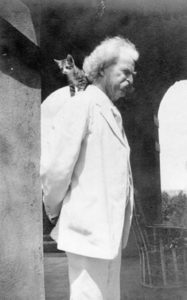
Mark Twain
*Mark Twain was born on this date in 1835. He was a white-American writer, humorist, entrepreneur, publisher, and lecturer.
Twain was born Samuel Langhorne Clemens in Florida, Missouri, the sixth of seven children born to Jane Lampton, a native of Kentucky, and John Marshall Clemens, a native of Virginia. His parents met when his father moved to Missouri; they were married in 1823. Twain was of Cornish, English, and Scots-Irish descent. He was born two months premature and so thin and sickly, his mother remembered, that "I could see no promise in him." Only three of his siblings survived childhood: Orion, Henry, and Pamela. His sister Margaret died when Twain was three, and his brother Benjamin died three years later. His brother Pleasant Hannibal died at three weeks of age.
His intersectionality with Blacks in America is a hallmark of his personal and professional life. When he was four, Twain's family moved to Hannibal, Missouri, a port town on the Mississippi River that inspired the fictional town of St. Petersburg in The Adventures of Tom Sawyer and the Adventures of Huckleberry Finn. Slavery was legal in Missouri then, becoming a theme in these writings. Every summer, he spent several weeks on his uncle's nearby farm. There, he and his cousins gathered in the evenings in the cabin of an old slave they all called "Uncle Dan'l," who thrilled them with ghost stories and introduced them to spirituals and jubilees.
According to Ron Powers, a Twain biographer, "race was always a factor in his consciousness partly because black people and black voices nurtured him before he understood the differences white society instilled. They were the first voices of his youth and the most powerful, metaphorical, and vivid storytelling voices of his childhood. Uncle Dan'l and Aunt Hannah, who was rumored to be a thousand years old and a confidant of Moses, these were towering personalities to him." One of his most lasting childhood memories was of a dozen men and women chained together, waiting to be shipped downriver to the slave market. "They had," he said, "the saddest faces I ever saw."
His father was an attorney and slave-holding judge who died of pneumonia in 1847 when Twain was 11. The next year, Twain left school after the fifth grade to become a printer's apprentice. In 1851, he began working as a typesetter, contributing articles and humorous sketches to the Hannibal Journal, a newspaper his older brother Orion owned. When he was 18, he left Hannibal.
He worked as a printer in New York City, Philadelphia, St. Louis, and Cincinnati, joining the newly formed International Typographical Union, the printer's trade union. In the evenings, he educated himself in public libraries, finding wider information than at a conventional school. Twain described his boyhood in Life on the Mississippi, stating that "there was but one permanent ambition" among his comrades: to be a steamboat man.
Twain was an adamant supporter of the abolition of slavery and the emancipation of slaves, even going so far as to say, "Lincoln's Proclamation ... not only set the black slaves free but set the white man free also". He argued that non-whites did not receive justice in the United States, once saying, "I have seen Chinamen abused and maltreated in all the mean, cowardly ways possible to the invention of a degraded nature ... but I never saw a Chinaman righted in a court of justice for wrongs thus done to him". He paid for at least one Black person, Warner McGuinn, to attend Yale Law School and another to attend a southern university to become a minister.
Twain's sensitive views on race were not reflected in his early writings on Native Americans. Of them, Twain wrote in 1870: “His heart is a cesspool of falsehood, treachery, and low and devilish instincts. With him, gratitude is an unknown emotion; when one does him kindness, it is safest to keep the face toward him, lest the reward is an arrow in the back. To accept a favor from him is to assume a debt you can never repay to his satisfaction, though you are bankrupting yourself. The scum of the earth!”
Among his novels are The Adventures of Tom Sawyer (1876) and its sequel, the Adventures of Huckleberry Finn (1885), the latter often called "The Great American Novel." In his later travelogue Following the Equator (1897), Twain observes that in colonized lands all over the world, "savages" have always been wronged by "whites" in the most ruthless ways, such as "robbery, humiliation, and slow, slow murder, through poverty and the white man's whiskey"; he concludes that "there are many humorous things in this world; among them the white man's notion that he is less savage than the other savages." In an expression that captures his East Indian experiences, he wrote, "So far as I can judge, nothing has been left undone, either by man or Nature, to make India the most extraordinary country that the sun visits on his rounds. Where every prospect pleases, and only man is vile."
Twain was also a staunch supporter of women's rights and an active campaigner for women's suffrage. His "Votes for Women" speech, in which he pressed for the granting of voting rights to women, is considered one of the most famous in history. Helen Keller benefited from Twain's support as she pursued her college education and publishing despite her physical and financial limitations. The two have been friends for roughly 16 years.
He was lauded as the "greatest humorist this country has produced," William Faulkner called him "the father of American literature." Mark Twain was born shortly after the appearance of Halley's Comet, and he predicted that he would "go out with it" as well; he died the day after the Comet returned on April 21, 1910.